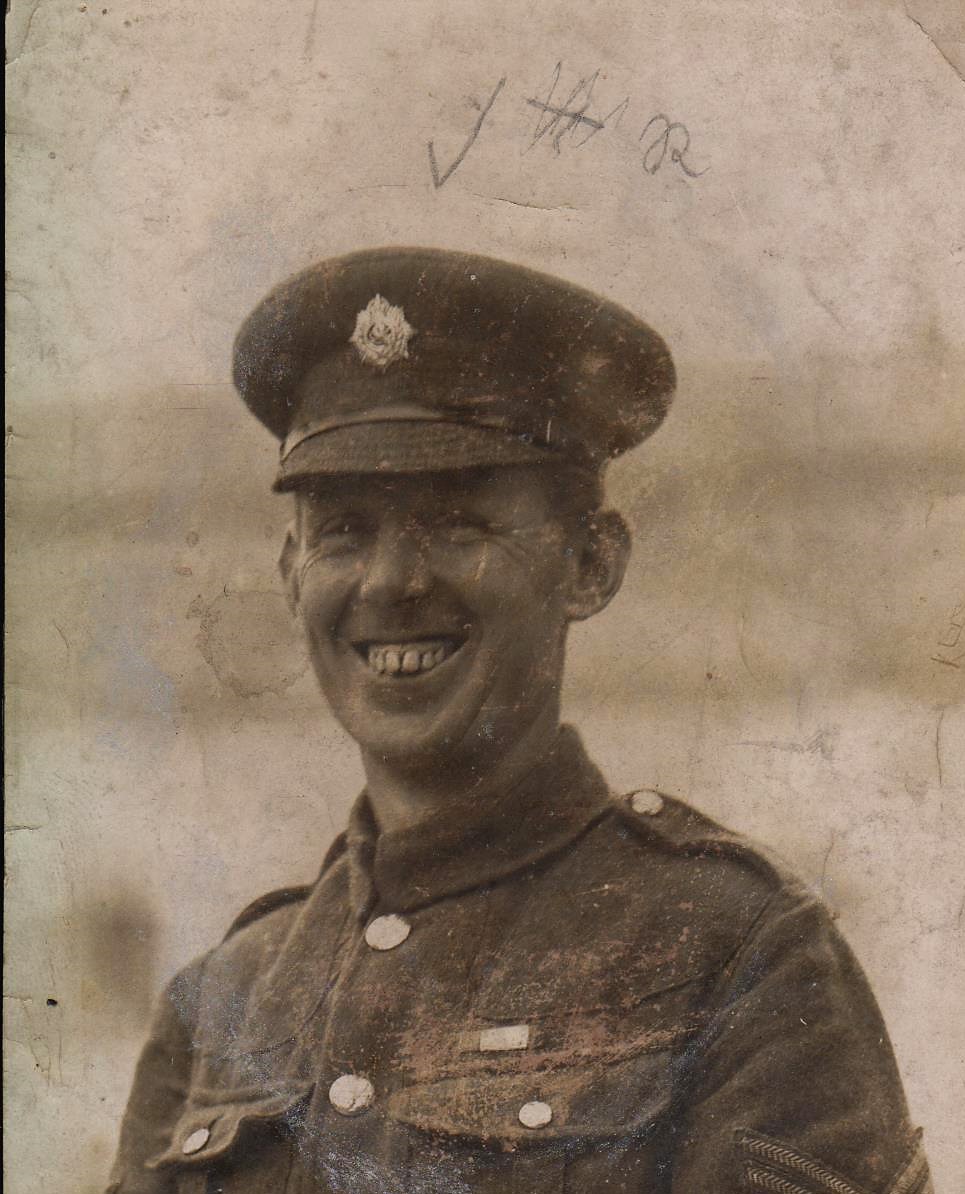
Gerald Burnett visited the museum to relate the story of his grandfather Ernest Wyatt Burnett.
My Grandfather, Ernest Wyatt Burnett was born in Chudleigh, Devonshire, in 1886. After minimal schooling and several agricultural jobs, Ernest moved to London and became a chauffeur with various employers including Thomas Tilling. He spent the pre-war years driving around Great Britain with American tourists and contemporary industrialists such as Tommy Lipton of tea fame.
Ernest enlisted with the Royal Army Service Corps, Mechanical Transport Branch, in April 1915 and became a Staff Car driver.
In 1915, the Government appointed five official Western Front War Correspondents, Philip Gibbs, Percival Phillips, H. Perry Robinson, W. Beach Thomas and Herbert Russell. Ernest was assigned to be their driver, a position he held until the end of the war.
Ernest was transferred to the Reserve in February 1919. Alongside his ‘Pip, Squeak and Wilfred’ decorations he was awarded a Silver Medal for Merit by Nicholas I, King of Montenegro.
During WW2, Ernest served with the Home Guard at Balcombe Place, his Sussex home, where he was chauffeur to Lady Gertrude Denman who was President of the Women’s Institute and Honorary Director of The Women’s Land Army.
My Grandfather was one of the lucky ones. He served his country, survived two World Wars, and lived a full and interesting life.




Explore more memories from the ribbon
-
Joseph Allen
Joseph (third from left) was born around 1884 in Ainderby Steeple near Northallerton in North Yorkshire. He was the eldest of five children to Thomas and Amelia. He would eventually end up living at East Witton where he worked on the Jervaulx estate. He married Agnes Kendray and they would have three children. Joseph was a fine athlete as witnessed on Coronation Day June 22nd 1911. In the fell race to the top of Witton Fell and back Joseph came first. His exploits were published in the parish magazine. Joseph enlisted at Middleham joining the 7th Battalion Yorkshire Regiment. The Battalion embarked for France on the 13th July 1915. It was during operations in February 1917 in an area of the Somme that heavy German artillery would take a heavy toll. A shell destroyed a cellar being used to house stretcher cases killing most of the men. One of those reported missing was Private Joseph Allen. His body was never found. Joseph’s name is commemorating on the Thiepval Memorial. A service was held at East Witton Church on the 3rd March. Tragically, one month after the service, Joseph’s widow Agnes died, aged 33, leaving three young orphans.
-
John B Lishman
John Benson Lishman was nearly 47 when he was called up to join the London Electrical Engineers in February 1918 as a Pioneer. While his War Service was relatively brief and uneventful it was the work he did before enlisting that proved to be his enduring legacy. On April 10th 1915, Lishman set up the first meeting of the 8th Darlington Scout Group with 12 members. It was his idea to provide activities for young people while their fathers were away fighting. The first thing the boys did was set up a Drum & Fife band and played concerts in aid of the Red Cross. Some of examples of the 8th’s packed programme include camping, hiking, badge work and collecting materials for the war effort, most of which they still do today. It was a sad day when the Troop learned that their Scout Master was leaving them, as this excerpt from their Log Book tells: “The lads had collected a small pocket wallet & the Secretary presented it as a small – a very small token of love & respect for the work & time spent on us by the S.M.” Lishman returned to the Group in 1919 and after a “solemn handshake” it was back to normal. Submitted by the grateful Leaders and Members of the 8th Darlington Scout Group.
-
Gilbert Davison Pitt Eykyn
Gilbert Davison Pitt Eykyn was born at the France Lynch parsonage in Gloucestershire on the 22nd August 1881. He was baptised on the 29th September 1881. He was the only son of the late Reverend Pitt Eykyn. His father at the time of his death was Chaplain at Parel Bombay. Gilbert married Emily Constance on the 28th November 1902 and a son, Duncan Arthur, was born on the 11th August. The 1911 census shows that Duncan was born Poona in India. At some point after the family returned to England they moved to Northallerton in North Yorkshire. Gilbert was a career soldier. He was also a gifted linguist, having passed Army exams in Russian, French and Hindustani. He received his first commission with the 3rd Loyal North Lancashire Regiment in 1899. He then joined the 4th Manchester Battalion in May 1901 and was promoted to Lieutenant on the 24th December 1901. He joined the Royal Scots on the 4th February 1905 attaining the rank of Captain on the 26th June 1913. On the 13th February 1913 he was appointed adjutant to the 4th Battalion Yorkshire Regiment in Northallerton. During his military career he had served in India and saw action in the 2nd Boer War (1899-1902). Gilbert was with the 4th Battalion Yorkshire Regiment when they arrived in France just prior to the 2nd Ypres offensive. He was killed leading his men in the storming of St Julien on the 24th April 1915. He was 34 years old. Gilbert has…
